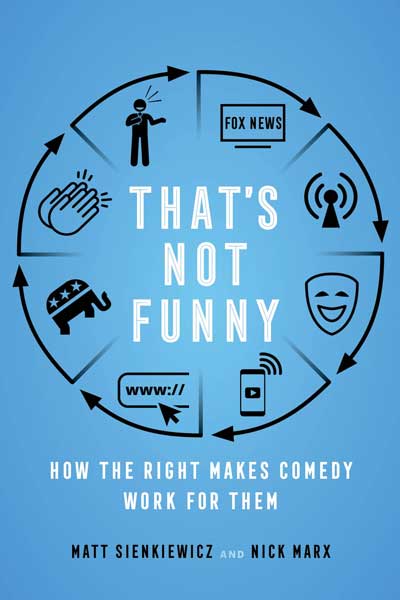Justice League
James Sasso ’12 shares what it was like to work on the DOJ's Jan. 6 investigation.

Illustration by Ryan Olbrysh
How the Right Learned to Take Comedy Seriously
Conservatives are suddenly all in on being funny. BC Communication Department Chair Matt Sienkiewicz explains why.
Comedy, as we all know, is an art form that comes from the left. It’s created by liberals, for liberals, and its primary aim is to skewer and antagonize The Man—which, for essentially ever, has meant the conservative establishment. Well, no longer, according to Matt Sienkiewicz, the chair of the Boston College Communication Department. In That’s Not Funny: How the Right Makes Comedy Work for Them, Sienkiewicz and coauthor Nick Marx of Colorado State University explore the right’s embrace of humor as a political organizing tool. The book, published last year, details how conservatives are suddenly finding influence and profit in laughs on everything from Fox News to network sitcoms to internet podcasts and vlogs. We spoke with Sienkiewicz to discuss the social and political implications of the right getting serious about comedy, including a troubling increase in overt racism, misogyny, and homophobia, and whether comedy from the left has become too risk averse. The following conversation has been lightly edited for clarity and length.

Politically speaking, comedy has historically been associated almost exclusively with the left. What explains the right’s growing interest in comedy as a political organizing tool?
It comes very much in the wake of Jon Stewart’s popularity as the host of the Daily Show. You had changes happening at that time in American politics and in the media, and together they made the Daily Show a really important place for political discourse and debate. And of course, that program for various reasons is oriented toward a younger sort of liberal audience, and it all led up to this moment in 2004, 2005 where you could ask, Who’s the leader of the Democratic Party? Is it John Kerry, or is it Jon Stewart? I mean, who was drawing more people for their rallies? The answer was Jon Stewart. It sort of came together to become an idea that liberal politics and comedy go together. This connection seemed really clear and people took it to be a truism.
The point of your book, of course, is that this is no longer the case.
Things started changing during the early Trump years. Comedy was becoming central to what the right was doing with its strategies, particularly on Fox News. I recall watching an episode of Watters’ World on Fox. They had this bit about liberals prepping for the end of the world. So I Googled the person who was on the show, and I realized he had, the day before, done the same bit on the Daily Show. We write in the book about how the correspondents of the Daily Show were asked whether there could ever be a right-wing version of their show. And one of them said, “Oh, I think there’s this guy, Greg Gutfeld, but forget him.” And Gutfeld’s show on Fox News was already beating them in the ratings. Eight years later, the media industry’s changed, politics has changed, and there are all these people playing very similar roles on the right to the one Jon Stewart used to on the left. Even if, as comedy critics, we want to say the quality of their material is very different, our argument is that industrially and culturally, it’s not very different.
One of the people playing that role on the right is Joe Rogan, the host of the wildly popular Joe Rogan Experience podcast. Spotify is reported to have paid more than $200 million to become the exclusive home of the comedian’s podcast, which is said to have eleven million listeners. There’s some debate, though, about the true nature of Rogan’s politics.
A lot of people got mad that we put Rogan in the book. They say he’s not right wing—he supported Bernie Sanders, etc. I think that’s correct, and we don’t actually call him right wing. We say that his show is part of the right-wing comedy world, and maybe it’s also part of a sort of far-left comedy world. Joe Rogan doesn’t have politics, really. He has demographics. Rogan will move to the next thing that interests young men, ages eighteen to thirty-four, who are not necessarily all that well formed politically. And so after Sanders dropped out, he went to Trump. He didn’t go to Biden or Elizabeth Warren or whoever else you might think would be closer to Sanders. He went to Trump. And why is that? Trump is more interesting to people in his demographic. And if you look at the comedians Rogan brings on, they do tend to be these sort of right-wing-ish, libertarian-ish types because they tend to stir up these young men.
Rogan has spread conspiracy theories that have misinformed his listeners, and has used racist language on his show. You’ve pointed out that his guests can push these same limits.
He’s a launching pad for a whole—some of the people who appear on his podcast will call it heterodox, they’ll call it sort of free-speech oriented. And partly that’s true. But it also happens that the free speech in that world is almost always used to say racial slurs. It’s to tell antisemitic jokes and use the N-word.

BC Communication Department Chair Matt Sienkiewicz, whose new book explains the right’s sudden embrace of comedy. Photo: Lee Pellegrini
Rogan has been a springboard for other right-wing comedians. They may not have his reach, but as you point out in the book, the media has changed in a way that you no longer need a vast audience to have an impact.
There used to be a distribution bottleneck—you needed an actual media outlet to publish or broadcast your content. With the internet, there’s no longer a distribution bottleneck. You can get your content out there on your own. What you need is an audience—but it doesn’t have to be millions. You just need twenty thousand people from a demographic that’s desired by advertisers, such as young men. So now you have these comedians trying to build an audience from that demographic. They’re all looking to make a name. If the cultural winds were different, many of them could have ended up doing totally different political comedy, but the right is where they found reactions. Another piece of it is a broader cultural framing. Over the past five or six years, the right-wing world has effectively positioned itself as countercultural. And that’s where comedy always wants to be. Comedy always wants to be perceived as countercultural. Meanwhile, the right has been able to position the liberal world as The Man—as the thing that holds you back—and the right-wing world as a place where you can express freedom.
Your book makes the case that the appeal of a certain type of right-wing comedy isn’t even the comedy itself. Tim Allen’s sitcoms, for instance, use laugh tracks and familiar plot lines to intentionally position themselves as alternatives to more cosmopolitan—or “liberal”—shows such as Modern Family and The Office.
There’s this whole world—we call it paleo-comedy—where the idea is, We don’t do what the liberals do. So the liberals make Modern Family. What the right-wing world will say is, We don’t do that. We make good old-fashioned American comedy where dad’s in charge. Let’s look at it through the lens of Trump. There are some who see Trump as MAGA, as this thing from the past when things were better. Others see him as an iconoclast tearing down the Clinton dynasty. The Tim Allen version is the MAGA version: Remember the eighties? Weren’t they great?
Speaking of decades past, the right-wing comedy of Dennis Miller that emerged after 9/11 seemed primarily concerned with characterizing liberals as soft-headed or wimpy. It was a dismissive critique of a progressive worldview. Even Rush Limbaugh was more likely to hint at bigotry than loudly proclaim it. What’s behind the transformation of today’s right-wing comedy, which you’ve described as more overtly racist, sexist, and homophobic?
I’d point out that Miller and Limbaugh could be explicitly misogynist. And Miller was pretty aggressively Islamophobic. However, when it came to racism, mostly anti-Black racism, I think it was much more subtle. And one thing that you rarely saw from the right-wing world, and now you see all the time, is overt antisemitism. So why do we have that now? Partly it’s that right-wing comedians used to come from credentialing organizations. Miller, for instance, was on HBO. And even when he went to Fox News, it was not a total free-for-all—it might be past some people’s line, but it has a line. Whereas, internet-based stuff has no line. And when you enter into the comedy game, you can’t just stop at someone else’s line—if Joe Rogan is doing edgy stuff and you want to get your audience, well, the easiest way to do it is to be a little bit edgier. That’s how you get the Legion of Skanks, which is like a nightmarish version of Rogan. They appear on his podcast. It’s very misogynist. It’s positioned as ironically antisemitic and racist, but it’s really sort of overt. So now they’re established. If you come next, you’ve got to be edgier than they are. There are these guys now, literally, doing Nazi comedy. You get these fine-grained jokes about, you know, Holocaust denial.
You argue that comedy from the left has become too cautious and has lost some of the edge that young audiences are drawn to. What are the political implications of this shift?
Young people—particularly young men—who have yet to find where they stand morally and politically are often shopping in the sphere of culture for their politics. They’re looking for things that seem cool and fun. Joe Rogan seems cool and fun. And he sends them down to the Legion of Skanks, and they also seem cool and fun. If you don’t want that result, then comedy from the liberal world has to be able to be cool and fun, too. I don’t think the right is correct when they say “Oh, you can’t say anything in the left-wing world,” but I do think there’s a risk aversion that’s taken hold in our cultural spaces, and it’s a problem. We need to move away from an idea that there’s a binary between respect and fun, that it’s either one or the other. The right is really successfully imposing that binary, saying, “Yes, they’re very respectful over there, but they’re no fun—and which one do you want to be?” We can expand our notion of respect to include something more playful, and also just, you know…sometimes a comedian makes a joke and it’s a miss and they apologize. That should be enough. If you know that the alternative is sending the people to the Legion of Skanks, then I think we need to expand our willingness to tolerate an occasional misstep. 